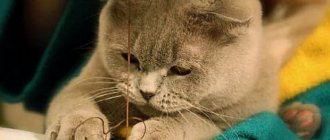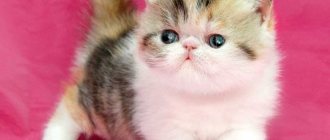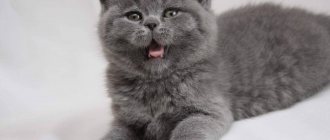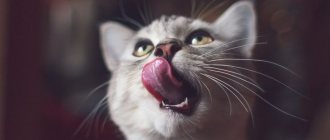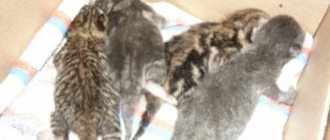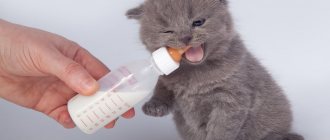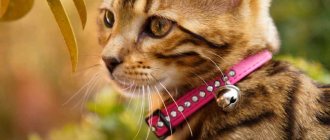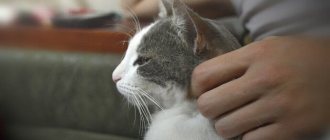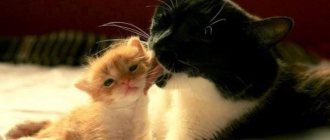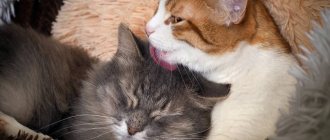You can’t describe the character of a British cat in a few words. It’s the same as saying about Napoleon’s life “he led France.” Only, the British are not French. They are proud, sometimes arrogant. We are talking about cats, about them - cats of the British breed.
Only this fact does not mean that representatives of the breed never want to be petted. They want it, but when they need it, and not at the moment when the owner takes it into his head. This cat is a personality. He has an opinion that must be taken into account. To understand what kind of character British cats have, you need to watch them a little, or better yet, live in the same house for several weeks.
Features of the appearance of the breed
Representatives of the British breed are distinguished by their stockiness and unusual plush fur. Pets come in medium and large sizes. They are beautifully built and have good muscles. The fur does not adhere to the body, which is why pets look like plush toys. At the same time, it has a uniform length; often the undercoat has a darker color than the main shade of the coat. The limbs are short but strong.
The British breed is characterized by a large head with pronounced cheekbones. The eyes of the pets are wide open, the nose is straight, the ears are quite short, because of this the muzzle looks more rounded.
The color of the British is not only blue. Although mostly people have pets of this shade. Cats may not be the same color; uneven coloring of the coat is also allowed. Each shade has several variations, for example, lilac is divided into three types: light, medium, dark.
The British breed inspired Lewis Carroll to create the Cheshire Cat. The character was based on the wide and slightly smug muzzle of the British.
In fact, according to the breed standard, at least thirty types of colors are known:
- black;
- white;
- creamy;
- chocolate;
- lilac;
- ginger;
- tortoiseshell;
- marble;
- chinchilla;
- brindle;
- mackerel;
- smoky;
- tabby;
- spotted.
History of the breed
We would like to say right away that the breed of British cats is far from new. Despite the fact that no documents have been preserved about the origin of the British, researchers have their own quite plausible version of the origin of the ancestors of modern four-legged aristocrats. According to them, around 43 AD, Roman centurions brought very large cats to the British Isles to catch rats and mice that carried various diseases.
All this time, fluffies were faithful assistants to people, and they began to invent breeds for them: in Britain they were called the British cat, in France - Charteuse, and in Germany - they were called Cartesian cats. Until the end of the 16th century, they were used and perceived exclusively as hunters, but people were still interested in the curious appearance and color of the cats.
And in 1817, British cats visited their first exhibition in London. There, the breed standard and its characteristics were adopted, and the four-legged fluffies themselves began to actively conquer human hearts.
This cat breed appeared in Russia more than 100 years later - in 1992. At the same time, the Kartheusers, who are considered the predecessors of modern Britons, were brought into the country.
By the way
To ensure that the unique traits of British cats were well preserved and passed through the centuries, breeders resorted to a little trick - they crossed Britons with Persian cats. This fact answers the question why these aristocrats have a slightly flattened muzzle.
Tea dictionary
| Aroma | Aroma |
| Boling water | Boiling water |
| Brew | Welding |
| To brew tea | Brew tea |
| Ceylonese tea | Ceylon tea |
| China | 1) China 2) Porcelain |
| China tea | Chinese tea |
| Cup | Cup |
| Curd | Kurd, custard |
| Darjeeling | Darjeeling (type of tea) |
| Earl Gray | Tea with bergamot |
| Green tea | Green tea |
| Herbal tea | Herb tea |
| Indian tea | Indian tea |
| Kettle | Kettle (for boiling water) |
| Lump (of sugar) | Sugar cube) |
| Milk | Milk |
| Mint tea | Tea with mint |
| Oolong | Ulung (type of tea) |
| Saucer | Saucer |
| To stir | Mix |
| Scone | Scone, classic English muffin |
| Strong tea | Strong tea |
| Sugar | Sugar |
| Taste | Taste |
| Tea house, tea shop | Tea house, teahouse |
| Tea leaves | Tea leaves |
| Tea strainer | Tea strainer |
| Teapot | Teapot, teapot |
| Teaspoon | Tea spoon |
| Weak tea, watery tea | Weak tea |
| White tea | White tea |
British: cats with history
The best British cats took part in improving the breed. However, these cats also owe their modern appearance to their Persian representatives. From them they received a characteristic slightly flat muzzle.
World wars had a negative impact on the development and improvement of the British cat breed. The population decreased, so breeders crossed the remaining Britons with representatives of similar breeds.
This is how the blood of Burmese, Scottish cats, Russian Blue breeds and Chartreuse got into the genetics of the British.
The formation of the breed was finally completed by 1980. This year, British cats received the title of champions, and felinological organizations confirmed the official recognition of the individuals.
The British became the first English breed to gain worldwide recognition.
Character traits
The character of the British is formed before one and a half years. If you miss time, it will be difficult to re-educate the cat.
The British breed has a special temperament. Cats do not tolerate humiliation and rudeness. With the right approach, they behave in a dignified manner, do not destroy the house, do not bite, or spoil things. You cannot limit their freedom by trying to grab them and carry them in your arms all the time. If the owner shows aggression towards the pet, then in the future the animal will hide and may even refuse food.
The pet will not show its owners weaknesses. He will not take revenge, like representatives of another breed, by tearing off wallpaper or ruining shoes. The British may spend a lot of time at home alone. But, despite their independence, they need attention and affection.
Representatives of the British breed are extremely patient; they do not react to minor mischief. Therefore, they get along well with all the inhabitants of the house. But if a cat is hurt, it will defend itself by using its teeth or claws.
About activity
The character of British kittens, like cats, can actually be reserved and sometimes even cold, but this does not in any way affect their activity. The British sleep a lot, but in their free time they will do what they want: run, jump, play. The exception in this case is only older representatives of the breed. Pets that have access to the street are more active. They are interested in everything around them: leaves, butterflies, flowers, so cats can spend hours on end outside. If there are several cats in the family, then additional activity will be provided. This is very good, since active animals have much fewer health problems.
Important! To prevent your cat from lying around in the apartment, you should play with him from time to time and offer him some options for useful ways to spend his waking hours.
How to raise a cat - habit formation, punishment, praise
Habits, unlike character, are formed throughout the pet’s life. Therefore, owners, with a little effort, can raise a cat correctly. The main thing is to immediately let your pet know who is in charge in the house.
The British are considered very clean. Kids imitate their mothers in everything, adopting her good manners. So, in order to accustom a kitten to the tray, a couple of days are enough. Adults regularly wash themselves and clean their fur. But at the same time, they don’t like it when their owners start fiddling with their fur.
Bad habits
British cats love to drop objects from heights. They like to watch the process of falling. As soon as the owners notice this prank, they should immediately scold the animal. To wean your pet from climbing into prohibited places, you need to treat the surfaces with a special product.
A kitten under four months of age may bite and scratch as it is teething. If this continues into adulthood, then this indicates improper upbringing. Therefore, it is worth initially giving the British toys that can be bitten instead of the owners’ hands.
The most harmless bad habit is checking bags and packages. It is difficult to wean your pet off of this, but it is worth scolding him for such tricks so that a reflex is developed.
Should a Briton be punished or praised?
If a pet has committed an offense, then you need to scold it immediately. Otherwise, he will not understand the essence of the claims. Moreover, the British will harbor a grudge and prefer to be as far away from you as possible.
The carrot and stick rule works with animals, as with people. That is, the animal will develop reflexes not only to punishment, but also to praise. It is advisable to notice positive changes in the cat’s behavior by talking about it out loud.
British cat - reviews
- + Leave a review
Nick
07/14/2021 at 16:02Answer
Breed not to touch
Leave a review Reset
Mila
The British are amazing, with their own character, playful, clean, never steal from the table, and picky about food. We only have Heels dry food. If you don't change the litter in time, ours will poop nearby. The coat is a little shorthaired, although I compare it with Persians. He always greets you, especially at night when sleepy, he stumbles, but runs, lets you pet him for a minute, purrs, then hisses and runs away. On average, he asks for affection twice a day and sits on your lap. I like this kind of independence and core. He doesn’t like it when he’s always being squeezed, but at the vet he behaves like a king and doesn’t even make a peep. He just looks from under his forehead, saying, hurry up with your ultrasound of the heart. Hunter. Catch all the flies.
Varvara
My friend has a British cat, silver chinchilla color. Very handsome, affectionate, walks with his tail, loves to play with mice from the pet store and to be scratched)). But he doesn’t show that kind of love to everyone. Only to family members and to me, since I love cats very much, and they feel it. + I’ve known him since childhood, I always bring him toys or treats, he always runs and jumps and pets me! He treats other people with either indifference or hostility (in this case he may hiss and even throw himself). Of the minuses: wool, white! Especially on dark clothes! Not easy to remove! The cat is neutered, litter box trained, but sometimes, depending on his mood, he shits either in the bathtub or in flower pots. Either he’s taking revenge for lack of attention, or he’s just fooling around, but it’s a fact. Another very important point: a friend gave birth a year ago, at first the cat was very jealous of the new family member and constantly meowed and ran around at night as luck would have it, but then he got used to it and now he and the child are inseparable friends, he’s like a nanny)). I adore British and Scottish cats, but these two breeds are distinguished by their “wild” character. I think that my friend was lucky to have a cat, but it’s really a lottery. If you want an affectionate cat and don’t care about appearance, then it’s better to look at other breeds. Personally, I had a cat of an exotic breed, she was also an unapproachable queen, not inferior to the British in harmfulness, so I don’t want cats anymore, although I love them. I'll take the dog!))
Xieya
https://otzovik.com/review_4720804.html
Advantages:
Beautiful
Flaws:
shedding, not affectionate
We have a British cat in our house for almost three years. My nephew grew up a little, and we decided to buy a cat. The choice fell on the British breed solely for their beauty. From the photos they are very cute, plush creatures. Didn't read the reviews.
By coincidence, a cat was offered to me by a colleague at work. They showed a photo of the baby’s British parents, and we “melted” with emotion and decided to buy it.
For six months or a year, our handsome guy settled in and was friendly. He got potty trained quickly, ate special food, and didn’t get underfoot. He behaved quite peacefully, as usual. He became very large, about seven kg. The coat is shiny, with a beautiful lilac-gray tint. Constantly licks himself. He doesn’t like anything extra except food, only (in rare cases) a certain part of a chicken breast.
There is one detail - the British cat chose his owner (this is my sister), and his behavior towards her and towards the rest of the family members is different. The cat follows her like a dog, waits at the threshold, from the bathroom, reacts to her words in a guttural voice, in general there is pure love and devotion.
He behaves much cooler with others and does not give in to hands. Runs away or hides. Almost doesn't purr.
After castration, things changed for the worse. Any attempt to pet him began to cause a violent reaction in the cat, growling threateningly. Sometimes, there were attempts to wave it off with his paw, periodically growls, even if you pass by without touching. In my opinion, this is not the right cat.
What’s also interesting is that he doesn’t like hands, and if you touch him with your foot, the cat starts to go crazy. A sort of fetish.
You can pet a cat only if it is sleeping. In our family, everyone loves cats, and they changed periodically, the British cat is the angriest. Before this, there were Persian and even Siamese cats, but they could not think that such a reaction could occur to their owners.
Now we have adopted a second cat, a Neva Masquerade breed, and we couldn’t be happier. Our British cat was very jealous of the neighborhood. Now he shows aggression towards the newcomer. So, think twice before adopting this breed. I don’t recommend it, in my opinion, cats should be affectionate.
Ysna94
A very wayward cat, very smart, responds to her name, understands when you scold her, sometimes if you don’t like something, she goes wherever she wants, but this is very rare, playful like a dog, she can chase me around the room, grab my legs , run away, hide around the corner and pounce and chase again, it’s not boring with her, she’s very picky about food, only food or meat, nothing else, clean to the point of madness, loves affection and attention, can swear when guests are present, this is expressed in the fact that the cat rushes around the whole house, thereby attracting attention to herself, loves to sleep with me, and it is important for her to lie down on her entire chest and, as it were, hug her neck with her paws, my husband and I are delighted with her moments, human appearance, the cat is with us has been living for 2 years)
Natalia
Our cat Nyusya was sterilized, they gave her to us as an adult, and we had a dog. She is of royal blood, very majestic and vengeful. It took me a long time to get used to it, the main thing is not to pester her, she likes to approach her herself. If something goes wrong, it will make a mess. But it kills flies with its paw on the fly. But overall a good, smart, characterful cat.
Guest
https://www.woman.ru/home/animal/thread/4198733/
And I have a British woman, it’s some kind of nightmare. In order to pet her, you need to catch her first; as soon as she feels that she is about to be petted, she takes off with a jerk. Doesn't like children, attacks when they pass by close. When he wants to eat, he attacks the owner’s legs and bites her. He never purrs or lies next to him. He goes to pee under the door, they put two stools near the front door, and next to it there is a tray, now he goes into the tray, but as soon as you remove the stool there will be a puddle. Now to get out of the apartment we jump over the chairs. This is the problem that lives with us)))
Maria
We have a cream-colored Briton, I don’t regret at all that I chose him! We adopted Archik very young, 1 month old, bottle-fed him, trained him to use a tray without any problems)) Now he is an 8 kg cat who sometimes earns his own food and litter) What can I say, I agree that he loves me more than his husband. Since my husband tried to train him, etc.. When he loses me, he’s happy with the op) if I leave, he sees him off. I come and greet you) if I call you for petting, I just call you by name or show your hand, he always runs)) He is very clean, he always says that he has done his business, go clean up))) Only problems with the wool... But we save ourselves by combing 3 times a week... For me , this is a devoted animal.. I’ve never seen him let out his claws without doing anything (well, if only on my husband, who asked for it))
Storm
Foma appeared with us spontaneously. We've wanted a cat for a long time. We looked at different breeds. But not a British one.
A special point when choosing a breed was the short coat. In this regard, special preference was given to Peterbalds, Burmese and Canadian Sphynxes. The Devon Rex held the palm. They chose slowly, even lazily. One day, my daughter showed an advertisement where two British kittens were for sale. We consulted with our daughter and, having decided that they would not take money for viewing, we went to see what kind of animal it was. All I knew about the British back then was that they were “plush” and terribly independent. I wanted him not to get away with it, but to bestow him with royal affection without measure. When they arrived, they showed us two kittens and carried out their mother. Tiny fluffy lumps; beige and smoky, persistently trying to get out of the box. The daughter clung to the smoky baby, who nestled comfortably in her arms. I sighed about the Devon I dreamed of purchasing and announced my decision to take the kitten. Then I was not alarmed by the owner’s phrase, I quote almost verbatim, “In a year he will become as plush as his mother.” But in vain. As time went. The kitten ate, slept, played, grew and became more and more shaggy. Not a hint of "plushness". He is now one year and four months old. This is a magnificent animal, take a look at it. But all the charms of long hair, which I diligently wanted to get rid of, are always nearby. We also struggled with feeding. At the very beginning they fed him with ready-made food. Many people praise this power system, but it didn’t work for us. The cat was as thin as a bicycle. We switched to natural and took a long time to rebuild. But in the end they recovered and returned to normal. Now we only eat boiled eggs, black bread, cottage cheese, and in small doses beef and fish. Oddly enough, with this diet, the cat feels great. The constant diarrhea and vomiting that had plagued him for several months stopped.
This is where the “global disadvantages” end for me. And I want to move on to the “pluses”.
Plus 1. Cleanliness. For me, this is the most important “plus”, which negates all the disadvantages of the cat. When he was neutered at nine months, the veterinarian warned him to leave the tray without filler for several days. We follow doctors' instructions responsibly. Therefore, the tray was brought into proper shape. Only the cat didn’t use it. He has already recovered from the anesthesia, but does not use the tray. Only, lies in it. Almost a day passed like this. We decided to violate the doctor’s recommendation and fill the toilet, so we went straight away. I endured it all this time. During our time together, we developed a kind of ritual; As soon as the tray is removed and filled, the cat will definitely go into it. Not so much by choice, but for order.
Plus 2. Affectionate. Yes, no matter what they say about their unsociability, affectionate. He doesn't like to be held in his arms, that's true. There is no use in holding. Sometimes you want to squeeze him so much that you can’t resist. It endures, struggles, pushes with its paws, but does not bite. He just meows pitifully. But running around like a ponytail, controlling all the household members, this is constant. You go to the hall, he is already nearby. You sit in the kitchen, he’s there. Lying down, looking at you. Purrs. She adores the child; sometimes, however, she will play with him, scratch him hard, or bite him. But here, anyone can do it, I don’t think it depends on the breed. She loves to lie on her daughter's study table, especially when she is doing her homework. Lying on the floor, slumped on his back, he walks and walks and suddenly bam, he’s lying down. So, without preparation, I just walked and fell. How a dog accompanies each family member to the door when we leave home. He also greets you upon returning from work. I was never late. This is especially touching. You open the door, and he’s sitting on the ottoman, jumps off and starts cuddling, rubbing against your legs, purring.
Plus 3. Lazy. Laziness has nothing to do with his playfulness; he is ready to run around like mad for hours. He loves to play hide and seek, when you run to catch up with him, and then you run away and hide, and he goes looking for him. From the outside it looks funny. He is lazy for climbing curtains, carpets and cabinets. But he fell in love with his daughter’s soft chair; he only sharpens his claws on it. And it doesn’t matter that there is a scratching post two steps away. Naturally he gets crazy when he pulls his claws on the material. At first I cursed, then I gave up this thankless task and sewed a cover for the chair.
Plus 4. Unobtrusive. The independence of the British is interpreted as a “minus” of the breed. Indeed, he will not hang on you like other breeds. But he will always be there, no worse than a shadow. Unobtrusively. Even when he is waiting for a plate of food, his meows do not resemble heart-rending death howls. Foma persistently, but tactfully, reminds him that he is here. And he wants to eat. My friends have been living with the Don Sphynx for a long time, an amazingly affectionate and talkative animal. Which, as soon as I cross the threshold of their house, climbs up my leg into my arms and sits, cannot be driven away. Or rides around importantly on the shoulders of the owner. When they come to me, they are surprised that the cat defiantly leaves the room, but so as to see the guests. Saying with all his appearance, “When will you leave?!”
Bottom line. You can talk about Thomas forever. I have never regretted that we took a British dog then, and not a Devon or Peterbald. Of course, sometimes his excessive independence offends him; he wants hugs, like with his more affectionate relatives. However, the Briton is such a gallant knight. Outwardly harsh and cold, but inside tender and immensely loving.
Michelin star
https://www.woman.ru/home/animal/thread/4198733/
they shed shamelessly. all year round. The whole shirt is covered in wool, when you come into the house it’s covered in wool, when you cuddle the cat it’s just felt boots.
Pavel Sof
Handsome, everyone's favorite, very independent, does not allow petting - only briefly on the crown, bites, hisses, eats dry and wet food. He often sleeps on his back. We all love him. They picked him up in December at the dacha under the house where he lived for 4 months.
(19930317) Alyona
https://www.imho24.ru/recommendation/52300/
Advantages:
They are smart and gentle.
Flaws:
Wool is everywhere.
I love cats, I always had a cat at home. Everything about the British cat, my friend has one. And she really is a beautiful cat. Smart, clean. Never had any problems with the toilet. Surprisingly, the cat easily got used to the bath. This surprised me greatly, because my cats usually got into wild fights.
But here I see a minus. The cat sheds heavily. You come and sit on the same sofa, when you get up you start to dust yourself off. Even if you don't pick up the cat. I think this is a problem. Although I think it’s always very individual. In general, it seems to me that it is not worth characterizing cats by breed. Each animal has its own character, its own habits and, of course, manners.
But here you need to appreciate the beauty of this breed, their softness. They are not expensive, so you can buy them if you wish.
Vesna
We have two British cats in our family, the most beloved boys, moderately hooligan, moderately prim gentlemen, very sociable cats, bright representatives of their breed, I hope I can persuade my husband to get a third cat? cats were taken from breeders at the age of 4 months
Truzze
https://otzovik.com/review_357620.html
Advantages:
soft fur, cute face
Flaws:
furious, aggressive, capricious, not human-oriented
This animal is for those who love fur products because the only thing that pleases them is their fur, which to the touch resembles a sheared mink, and that’s where all the advantages end. This cat's cute face does not compensate for her behavior; I have never met a dumber animal! The wild one is absolutely not focused on people, she just always runs around the corners like crazy, lives in some kind of separate little world of her own, perceives a person as a pillar, if I want to climb on him, if I want to scratch him! I have had repeated experience with these animals; I have never met any cat worse than them, by God! Cats have absolutely no brakes! I will never get myself this felt boot!
Asya
My cat is very calm and kind, but he loves to get into mischief. He’s also a terrible picky eater when it comes to food, tray fillers, and everything in general.
Nadezhda V
https://xn--80avnr.xn--p1ai/%D0%96%D0%B8%D0%B2%D0%BE%D1%82%D0%BD%D1%8B%D0%B5_%D0%B8_ %D1%80%D0%B0%D1%81%D1%82%D0%B5%D0%BD%D0%B8%D1%8F/%D0%91%D1%80%D0%B8%D1%82% D0%B0%D0%BD%D1%81%D0%BA%D0%B0%D1%8F_%D0%BA%D0%BE%D1%80%D0%BE%D1%82%D0%BA%D0% BE%D1%88%D0%B5%D1%80%D1%81%D1%82%D0%BD%D0%B0%D1%8F_%D0%BA%D0%BE%D1%88%D0%BA% D0%B0
Like many women, I adore the feline squad and can sing their praises for a long time. I like female cats for their cleanliness, playful nature, softness and fluffiness, unique disposition and temperament, for their ability to relieve stress and calm nerves. Cats are always a decoration for the home, subtle psychologists of the mood of the owners and guests!
My husband and I took a long time to choose a pet, since there are two children in the house and, first of all, it is necessary to build communication with our smaller brothers solely for the benefit of both parties, that is, so that the children enjoy communication with the animal, and the animal itself is not harmed: ). The most ideal option is a cat: you can pet it, play with it, and it definitely won’t give you offense.
The choice was made on the British Shorthair breed. I insisted here; I had long dreamed of having a plush cat with big round eyes, as soft and cozy as in the picture.
We adopted a 2-month-old blue-gray kitten. Now our Barsik is half a year old and this miracle weighs 4 kg, but he is supposed to grow for several more years).
Character of the British: I would characterize the British Shorthair breed as a noble, lazy, punctual animal.
Nobility is shown to all family members in different ways, but always correctly. Our kitty does not offend children, but tolerates them to the last. It never scratches even during active games, which is surprising, because cats love to let out their claws. He doesn’t like to be held, so when his daughter tries to drag him away, she starts screaming angrily, but even then he endures it and doesn’t bite her. In general, the endurance of the British is off the charts.
Laziness, like nothing else, makes our Leopard sleep day and night and, which is not yet typical for young cats, inactivity and lack of excitement during games. He plays certain games, often under duress, rarely on his own. I won’t say that my cat is dirty, but I rarely see him licking him. But he draws my attention to the need to change the litter in the cat litter, he himself is always present, observes and immediately goes to do things for clean litter :).
Punctuality is the politeness of kings! Apparently Barsik is aware of this statement, since he has a clear schedule of sleep, wakefulness and time for eating, playing with his owners or on his own. An important indicator of the cleanliness of the British Shorthair is that he goes to the toilet only where he was initially shown.
An excellent hunter: my cat’s favorite pastime is catching moving objects under the blanket (legs, arms); he often climbs under the blanket himself and catches invisible mice. Here the Briton’s skills can be given a solid “A”: clear, lightning-fast throws, grabbing the target with strong paws, often with claws. If there had been a mouse there, it would have had no chance to survive. My insatiable pet also loves to chase flying insects. Several years ago, wasps settled on our balcony and they consistently fly to the same place in the spring. Thanks to Barsik, my daughter plays calmly on the balcony, since he destroyed all the wasps.
Some useful tips:
- Cats have a habit of sharpening their claws in the place (room) where they most often sleep. To protect your walls and furniture, place the scratching post in your pet’s favorite place.
- Give food and any goodies always in the same place, this is very educational for the British and in the future he will not do dirty tricks and steal food from the master’s table.
- The British are very smart cats, there is no need to repeat something several times, this also applies to the cat’s toilet: where you show him the place, there he will do his business. By the way, they are not at all whimsical when it comes to litter for the tray. We started with clay, switched to sawdust, I think if you offer a lattice, he won’t really react to that either :).
- The British are not picky when it comes to food. We started with canned cat food for children, switched to adult cat food, offered dry food, boiled sea fish, minced meat, pieces of raw meat, milk - he eats everything with pleasure! He also finishes his daughter’s semolina porridge.
You can write about your favorites endlessly. I would advise having a British dog in families with children, since a calm, balanced, impenetrable character is quite an important indicator for a pet.
Lady of Southern Blood
https://irecommend.ru/content/esli-vy-ubezhdennyi-koshatnik-luchshe-ne-zakhodite-v-etot-otzyv-koshka-nedoumenie-ili-slishk
Advantages:
Majesty, very beautiful
Flaws:
tears up furniture, has a lot of hair when shedding, doesn't like being handled, doesn't like the company of strangers, is picky about food
Before you start reading this review and freaking out at my cynical conclusions, I want you to know: I love cats, cats love me, there have never been any problems. My parents are generally convinced cat lovers and the heroine of this review is far from their first. OK?
Then let's go.
There are homes in which the cat is a member of the family. And when she “leaves”, it becomes very sad. So much so that finding a replacement becomes vital. The previous cat lived for 18 years, died in the arms of a crying father... He loves cats madly, and not just as pets - it was his friend!
And then by chance we saw an advertisement for the sale of wonderful British kittens. They recognized “our” cat right away)) While she was getting everything she needed from the breeders, we spent a long time choosing her name. We looked through all possible options and decided that she was Katya. And nothing else.
When Katya appeared in the apartment, everything changed. She came as the hostess. I chose one “my person” - my father. All others are perceived to this day simply as slaves. Moreover, also enemy ones. )) To her with all my heart, with affection, she can also hiss, and hit with her paw, and scratch.
She idolizes dad, caresses him, purrs... When he comes home from work, and she runs to meet him with a loud meow, he says sternly: “What were you doing with Katya that she’s running to me like that?! Stop torturing the cat! “But no one laid a finger on her. In general, she is evil. From nature. He also doesn’t let him go to work, pulls him by the legs into the house, blocks the door...
She was toilet trained right away, and there have never been any problems in this regard.
Katya's only dirty problem is her fur. She sheds a lot! But I don’t consider this a minus, we knew what we were getting into.
Katya is a nervous cat. When a child moved into the apartment for three days, she did not leave “her room”; she walked along the wall and dashed to eat and go to the toilet. And then something like lichen appeared on the withers. The vet said it was nervous
The child never saw the cat, let alone played with it or tormented it in any way.
I laughed for a long time because Katya was bad at jumping. Seriously, she can't jump on the sink properly! Only onto the chair, and from there it goes across the table to the tap. And he immediately jumps to the floor, but it takes a long time to gather his thoughts and with a roar. As one book about the British assured us, this is normal, their paws are rather weak, a misunderstanding of the breed. So this mischief is crystal in all respects. Just shh! and then immediately ulcers from the nerves. Life is a pain when you are a half-cat)))
When she sleeps, she falls. Therefore, if there is a place to claw, she sleeps with insurance.
And God forbid if even one, the frailest flea gets into the apartment from the entrance! Katya is allergic to them. Straightaway. Veterinarian, treatment... And so on for any irritant that may hit our Katya. If she ended up on the street, she would have to live there for at most a day! She won't last much longer.
Katya eats well. Both dry food and soft food. She has 3 bowls: with dry food, with soft food and with cream.
Everything is clear with dry food - for her breed, she sometimes eats it.
Spiders. They put in a portion and called Her Majesty. She eats as much as she wants and immediately buries the rest. All! Even after 10 minutes, if she goes back to the bowl, she will NEVER eat it. Only fresh, only unburied. The yard cats recognize how the door opens on the 5th floor and run to meet dad with truly exquisite delicacies))) But he also buys soft whiskey and kitiket for them (yes, he really loves cats
Cream. If the expiration date on the box extends to several months, you don’t have to dirty the bowl, it won’t be like that. Only “live”, only fresh.
The British Shorthair cat is amazingly beautiful. This is her main advantage. She is smart and willful, but her character is bad. Therefore, sometimes it seems that she is an outright fool. But this is not so, she is simply harmful and pursues her line. She is very picky about food. She will not survive in non-greenhouse conditions and is completely unsuited to the life of a normal cat.
I can't recommend her enough. For “her” person (dad), she is an outlet and joy, for others she is a real punishment. Not a friend, not a cute fluffy ball, but a harmful, wild little cat.
Yes, I know that there are British people with a different character (I saw it live and read here), but we have one. This is our experience. And I told you the truth
where is the Bible?
Michael
https://www.woman.ru/home/animal/thread/4198733/
My cat is a bitch. 2 years old is not given in hand) as if she doesn’t like it right away in a pose. When we went to the veterinarian for an injection, we hissed and screamed and tried to bite and in about 20 minutes we managed to eat and eat. When I was washing her, she bit me on the finger) It began to fester and they removed the nail) The cat itself is amazing, but such a bitch behaves like a queen. If you don't touch it, everything is fine.
(ZlataLisova) Zlata
https://www.imho24.ru/recommendation/52300/
Pros: Kind, calm, plush
Disadvantages: does not like affection
I've been wanting to get myself a pet for a long time. The dog disappeared immediately; I simply did not have the patience and strength to walk in the mornings and evenings. That's why I settled on choosing cats.
Next there was the question of choosing a breed. I scoured the entire Internet, reading about all the breeds, learning the pros and cons. After some suffering, I chose the Briton.
It was a waste of money to buy a kitten from a breeder, so I found a purebred kitten for 4,000 rubles, without a cat passport. On the same day our miracle was at home.
I feed my cat chicken and generally homemade food. Still, my opinion is that meat is much healthier than premium food. Like all cats, Barosha does not like to wash himself, and in principle it is difficult to wash him due to his thick undercoat. We have a small child, and I’m not worried, because I’m sure that my cat will never hurt the baby. The only thing that upsets me is that this breed is not at all affectionate, he will never sit on his lap, will not lie next to him, and only allows himself to be stroked if he wants to eat.
I love my cat very much, this breed is perfect for those who spend every day at work, because the Briton is a cat that walks on its own.
Rusalka2016
https://otzovik.com/review_3265546.html
Advantages:
No
Flaws:
Eats favorites, not affectionate
If I had known that these cats had such a character, I would never have adopted her, it is better to pick up a yard kitten and give him a home and food, and he will respond with affection and his cute purrr.
Our cat's name is Bonya. She is 2.5 years old, not spayed. Very characteristic, obstinate, can’t stand hugs and kisses. He never lets you pet him unless he wants to eat.
She only eats chicken breast and oatmeal. Gourmet pate in a jar and only the taste of chicken! We tried many times to switch her to another food, we gave her fish, meat, all sorts of bags, she runs away from them! We bought dry food for both harmful cats and for the British, but they don’t eat it. I even starved for 4 days and didn’t eat.
She goes to the toilet in the litter tray, if it stinks, it’s pissed, she won’t go in it, she will circle around until you change it. If you don't change it, she'll get full or shit on the mat at the entrance.
Tanya159
https://otzovik.com/review_4390324.html
Advantages:
affectionate, warm, will love, smart, easy to train
Flaws:
always hungry, bites and scratches painfully, expensive food
The British cat, who has now lived with me for a year, was given to her when she was a kitten. The breed is incredibly beautiful and smart! At 1 month she was already trained to the tray. But it will not go into the tray if there is no filler there. She gnaws and tears furniture, and for up to 6 months she was definitely climbing on curtains. Sometimes you wake up and she’s sitting on the curtain))) She sleeps quite a lot, but if you don’t play with her during the day, then expect fun at night. In the morning he comes every time, lies on your pillow or on your head and purrs, even rumbles like a tractor))) Waits until you feed him. I only eat dry food from the Royal Canin series. Someone feeds the British with regular food, but all the vets told us NOT to. Because their food contains all the vitamins and microelements for normal functioning and the current appearance of the cat depends on nutrition. The coat should be soft and fluffy and should not tangle. If there is a lot of hair loss, it is better to reconsider your diet or go to the veterinarian. Mandatory vaccination every year. At 3 months, then a year and then just once a year. She only sits in her arms when she is sleepy or tired. And so you can hardly hold her, especially after eating, she runs around like crazy))) She climbs on the kitchen table, loves to pull sausage, but you need to wean her off this right away. Eyes also often get watery, for this you just need to buy drops (150 rubles). This breed of cat is ALWAYS HUNGRY and it is better when it is small to accustom it to two meals a day, and it is better for one person to feed it. Our whole family used to take turns giving her a handful and eventually she started vomiting. But it turned out that she simply overate. All animals have their own norm, which can be calculated! In general, she is very kind, sweet and playful. In the summer, you can’t open the balconies for plowing, otherwise she might climb and jump. Keep sharp objects such as needles away! nails! They also like to eat New Year's rain and tinsel, so it is better to refrain from this, otherwise there may be bad consequences. This plush miracle always meets and waits for you at home. And yet she loves the female sex more, especially getting tangled in her hair at night)))
sk__sk
Pros: Powerful cat
Disadvantages: There are simply none
How I love cats! A Briton, Basya, lives with us. Such a powerful, large plush purple cunning man has grown up. Lilac is like a blonde, light blue with a purple undercoat, unlike its “dark blue” relative. Of course, he had to be castrated when he was 9 months old, and he began to mark little by little. And now he’s so affectionate, though he doesn’t really give in to his hands, or rather, he allows himself to be scratched only according to the mood, not by everyone, but only by those who feed and play with him. My husband feeds Baska, I play with him - we are allowed, others are not.
Aggressive cat: what to do and where to run
Cats are very sensitive creatures with a subtle psychology, so their behavior is significantly influenced by external factors, especially strong emotions such as fear.
A cat that is afraid of something takes a characteristic pose - it presses its ears tightly to its head and moves them back, presses its head and body to the ground, tries to become more invisible, in many cases the animal simply tries to run away.
If it doesn’t run away, it tries to defend itself. A cat that is ready to defend itself looks like this - it raises its paws and swings them, makes sounds similar to spitting, hisses, its fur stands on end (especially on the tail, head and back), its back arches and the animal moves sideways forward, so a cat tries to show its superiority (including in size) and intimidate the enemy.
In most cases, fear is the main cause of aggression in cats. If your pet is timid, you should never deliberately provoke fear; you should also ask your friends and acquaintances to approach the animal slowly, not abruptly, and say kind words as they do so. Only in this way can possible aggression on his part be neutralized.
If the cat is ready to attack, is aggressive, you can spray water on it from a spray bottle, this will cool its ardor. If an animal scratches a smooth surface out of despair, it means that it has lost control of the situation. In this case, you need to put some kind of rug on the cat so that she can sharpen her claws on it, or wrap her in a warm cloth - this way the cat will calm down faster.
Another reason for cat aggression is defense of territory. If there are several animals living in your home, especially if you are the owner of several cats that have reached sexual maturity, they may begin to fight for leadership. To prevent this from happening, introduce the cats correctly in the first days.
The animal that lived with you before should definitely receive more attention - this way it will not feel threatened and will not become jealous. As a rule, cats that live together eat from the same bowls and use the same litter box, but this can cause aggression. Cat utensils should be separated as soon as you notice that the animals are demonstratively avoiding the litter box or fighting around the bowls.
Different smells of animals can cause them to fight, so the manifestation of aggression of one pet towards another can be reduced by bathing them with the same shampoo or spraying them with the same cologne.
Neutered cats, as a rule, are less aggressive, and even sworn enemies can be reconciled. But it is better to castrate animals between the ages of seven months and 1 year, until they acquire the habit of showing aggression and marking territory.
Often those who keep cats confuse their bites with aggression. Small kittens may bite you because their jaws itch (due to teething). Invite them to chew bones, but only those that they cannot chew, or large pieces of meat. Never feed bones from small animals and birds, or chicken bones, as kittens can chew them, causing damage to the gastrointestinal tract.
Often, when the owner tries to pet his pet, he may begin to bite, especially if you want to scratch the cat’s tummy (the stomach for cats is the most vulnerable place, if the animal allows you to scratch its tummy, it means it is subordinate to you and completely trusts you). However, this does not always mean that the cat is aggressive; most likely, your pet is simply not in the mood for communication at the moment or she does not like your affection.
Under no circumstances should you hit cats that show aggression - this will only make the situation worse. If possible, you need to eliminate the cause of the aggression and cool the animal’s ardor with a stream of water.
The following method may also help. You've probably seen how cats behave during fights (swinging their paws at each other, hissing) or mother cats with their children (ruffling them and holding them by the withers). You must do the same - lightly shake the animal by the scruff of the neck, lightly tap it on the nose with your finger, imitate the waving of cats' paws during a fight, hiss at it menacingly and be sure to look the cat in the eyes, since the one who looks away first will “lose” - These are the cat “rules”. You must ensure that your pet looks away, he will become somewhat confused, begin to hesitate, may begin to leave or lick himself - this all means that the animal has recognized you as the leader.
Did you like the article? Click the button and share with your friends! Let there be more happy people and cats!
brit-cats.ru
Buying a British Fold kitten
Since the breed is very common, despite its unrecognized status, there will be no difficulties in finding a pet.
British Fold kittens are sold by many private breeders
The main thing in this matter is the cost for which breeders are willing to give a plush purr. Since it is prohibited to breed and send such cats to exhibitions, British “Fold cats” are sold exclusively in the pet category. Accordingly, the price should not exceed 2–5 thousand rubles. per individual. If the seller insists on a significantly higher price and provides a pedigree marked BRI (breeding permission), then you should think about fraud. Or that a blue Scottish Fold cat is being sold under the guise of a British cat. However, the color of the fur coat can be any, which aggravates problems with breed identification.
In order not to make a mistake in your choice, you need to keep in mind the following differences between British Fold cats and Scottish ones:
- “British” are massive and stocky, while “Scots” are graceful and flexible;
- British purrs have a straight nose and without a sharp transition from the bridge of the nose to the tip (there is also no pit);
- The tail of the unrecognized breed is thick and rounded at the end, while the “Scots” have a cone-shaped end to the tail of the body.
You should buy a kitten no earlier than the baby is 1–1.5 months old. This is due to the physiology of the ears. After all, all kittens in a litter are born with straight ears, and the latter begin to droop only on the 21st day of life.
In addition, when choosing a kitten, you need to pay attention to the animal’s appearance and behavior:
- the eyes and ears of the fluffy must be clean, without pus and mucus;
- the tummy does not have pathological bloating (evidence of helminth damage);
- The fur is evenly distributed over the body, without tufts or bald patches.
It is mandatory to request from the breeder the pet’s veterinary passport and pedigree to identify a tendency to hereditary diseases.
Video: blue British Fold kittens
How to bathe a cat
The British are clean, but they still need to be bathed sometimes. To do this, you must use special tools and follow the following rules:
- the pet should be placed in a basin filled one third with warm water;
- When applying shampoo, you should support the cat under the neck;
- The soap product must be washed completely; a shower and a comb may be useful for this.
After bathing, the animal must be wrapped to dry the fur. When it dries, you can comb it carefully.
Pros and cons of the British breed
British cats become very attached to their owner and love him, although they do not show it in any way. They seem cold, arrogant and in all their behavior they resemble real Englishmen.
Character virtues:
- devotion;
- lack of aggression, treat children and other animals living in the house well;
- Quite patient and silent, they sense the mood of the owner;
- clean.
Character flaws: the British are independent and wayward animals, touchy and capable of taking revenge on the offender, picky eaters.
Description
The external characteristics of these animals are as follows:
- A rounded head, large cheeks, a straight and short nose, low-set small ears, large open eyes, most often golden in color.
- A muscular body with wide bones, a wide torso and a massive back, short limbs, the weight of females is on average five kilograms, and in males it can reach up to eight.
- Thick shiny fur. There are short-haired and long-haired Britons, the former have plush and delicate fur, the latter have a good undercoat and gorgeous pubescence of the tail, collar and panties.
- Two or one color, the most common are black, blue white, lilac, cream and red cats. There are also tabby and ticked specimens.
If an animal has too pronounced antler caps, a long hooked nose, or sharp facial features, this is considered a fault.
Difference between British Shorthair and Longhair
The British, like girls, are different. And their character depends on the variety.
A breed such as the British Shorthair cat has a very specific and ambiguous character. Depending on your mood, circumstances, your behavior and amount of attention, your pet may behave differently. If you anger an animal, this does not mean that you will be bitten right now. However, he has a good memory. And they will be offended by the owner for a long time. Therefore, it is important not to forget the main rule - the key to the heart of a British Shorthair is love and affection.
But the British Longhair cat has a much more flexible character than one with short hair. They are like heaven and earth. The long-haired British cat gets along with people and dogs in the house, will not try to eat your hamster or parrot, and will be friendly with you.
What to feed a Briton
An adult cat needs to be fed at least twice a day, and a kitten at least four times. Your pet should have a balanced diet rich in vitamins. A cat's diet can be represented by:
- natural food:
- boiled meat without bones and skin;
- liver;
- eggs;
- porridge;
- fish;
- vegetables;
- dairy products.
- ready-made food.
When choosing food, you should pay attention to the line of professional food intended for the British breed.
The British are friendly, moderately affectionate, and treat all family members evenly. And yet, a British cat should not be owned by families with small children who are eager to cuddle the animal. This breed will not allow itself to be made into a toy; accordingly, it will hide in corners and turn into a frightened animal. If you take into account the wayward character of the cat, then she will repay you with affection.
Features of behavior and character of British women
When characterizing British cats, you need to understand that everything depends on their behavior. If you want to raise an animal, then you need to do this only up to a year, after which you won’t be able to change anything. Some owners complain about disobedience, not realizing that this is a consequence of poor upbringing . The British are proud enough that they will never ask a person for help. These are not the breeds that will cuddle or purr plaintively, trying to attract attention. These representatives will try to act independently.
While still babies, British kittens easily learn to use the litter box. The aristocratic breed does not allow them to shit wherever they have to. If you look at how a cat sleeps, you can involuntarily smile: on its back, in a ball, with its hind legs outstretched, on its side. The places to sleep are no less fun. Sometimes fluffy hides in places where you wouldn’t even think of looking for him - in a laundry basket or among soft toys. The habits of the British dog are often unpredictable, but this is dictated by the breed and some inherent instincts.
Idioms about tea
cup of tea - something preferred, desired, loved
Lit. "someone's cuppa"
Something pleasant, familiar, to taste:
Teaching children to read is just my cup of tea. — Teaching children to read is mine.
not one's cup of tea - something alien
Lit. "not anyone's" cuppa"
“Not my thing”, “not mine”:
Going to church, Mary said, was not her cup of tea. “She doesn’t like going to church,” said Mary.
tea party - 1) crazy party 2) simple and pleasant event
Lit. "tea party"
1. Loud, noisy, “crazy” party: There was a loud tea party going on in the pub when Jess came in. — When Jess entered, there was a noisy and riotous party in the pub.
2. An easy and pleasant event that does not cause fear or anxiety: The test was a real tea party. No sweat. — The exam was easy. No tension.
not for all the tea in China - not for anything in the world
Lit. “not for all the tea in China”
Not for any price, not for any price, never in life:
I wouldn't give up my car, not for all the tea in China. “I won’t give up my car for any wealth in the world.”
tempest in a teapot - storm in a glass of water
Lit. "storm in a teapot"
Also tempest in a teacup (“storm in a teacup”), tempest in a glass of water (“storm in a glass of water”), much ado about nothing (Shakespearean, “much ado about nothing”); in the British version - storm in a teacup. Overreaction to a minor event:
All that because a handful of the thousand invited guests didn't show up? What a tempest in a teapot! - And all this because a handful of thousands of invited guests did not show up? What a storm in a teacup!
Features of breeding British Fold cats
Often, representatives of the breed are sold already castrated and sterilized, since the breeding of unrecognized purrs is prohibited by the world felinological community.
There is no official breeding of British Fold kittens.
However, if the owner is lucky enough to get an individual that has retained its reproductive functions, you can think about the possibility of procreation with a plush pet. In this case, it is important to remember that it is impossible to cross two fold-eared animals. Otherwise, the offspring will be non-viable and have pathological disorders in genetics.
British fold cats become sexually mature at the age of 7–9 months. However, it is better to carry out mating no earlier than 10 months for males and one and a half years for females. Since it is by this period of life that the animal’s body will be sufficiently ready for reproduction and bearing offspring.
The pregnancy of the British Fold lasts 64–68 days, and 3–4 kittens are born in a litter. As a rule, they all have straight ears, like “dad’s”.
Experienced breeders do not recommend breeding British Folds more than three times a year, otherwise there is a risk of giving birth to sick kittens.
If the owner does not have a goal of breeding British Fold cats, it is best to take care of the issue of castration or sterilization of the animal.
Thanks to modern medical technologies, the age at which such an operation can be performed begins at 2 months after the birth of the purr. Removal of the genital organs and their ligation is done using laparoscopy, so the recovery period is limited to 1–2 weeks for cats and 3–5 days for cats.
Before going to the clinic, you need to unload your pet’s digestive tract (do not feed for 12 hours). And a month before an important event, be sure to worm your coat and rid it of fleas.
In addition, the “British” dogs do not tolerate anesthesia well, so it is necessary to provide proper care for the purring dog after returning from the veterinarian. Every half hour you need to offer the cat a drink and accompany you around the house throughout the day. This will avoid unnecessary stress on the pet’s body and insure the fluffy from falls or injury.
Video: British cat immediately after castration
Health and vaccinations
British cats are the owners of good health and good immunity. This is the merit of breeders and geneticists. The most common diseases include obesity and increased lacrimation. By carefully monitoring your pet's condition and choosing the right diet for it, you can avoid these ailments.
If you don’t take care of your cat, he can get sick with any diseases that are typical for cats of all breeds.
Correct and timely vaccination is the key to a cat’s health. Before the first vaccination, you should undergo anthelmintic therapy. The cat is given medications that destroy helminths and parasites of internal organs.
At the age of three months, the British are given a rabies vaccination; it consists of three vaccinations, each of which is given three weeks after the previous one. Then it is repeated annually. Vaccination against infectious diseases is mandatory.
What to look for when choosing a pet?
Ears – growing straight and widely set. The tail is short and rounded at the tip, the paws are of medium length, strong and rounded.
The baby must be healthy, active, clean and well-groomed. There should be no foreign discharge from the eyes, nose or ears. Kittens' fur is usually smooth and velvety, soft to the touch, without pellets, tangles or bald spots. Make sure the kitten doesn't itch.
It is appropriate to ask for the kitten's pedigree and research the parents.
Choose a well-fed and strong kitten, but be prepared for the fact that the cost of just such a baby may be higher.
How to choose and distinguish a British kitten from an ordinary one
How to distinguish a British kitten from an ordinary one and not make a mistake? Professionals will help you make the right choice, so you should not buy a British kitten from unfamiliar breeders or on the market. The nursery or owners who have documentary evidence of the purity of the breed will be able to give guarantees.
A kitten should be chosen at the age of one and a half months, not earlier. This way the animal will already have formed its color, eye color and basic external characteristics.
